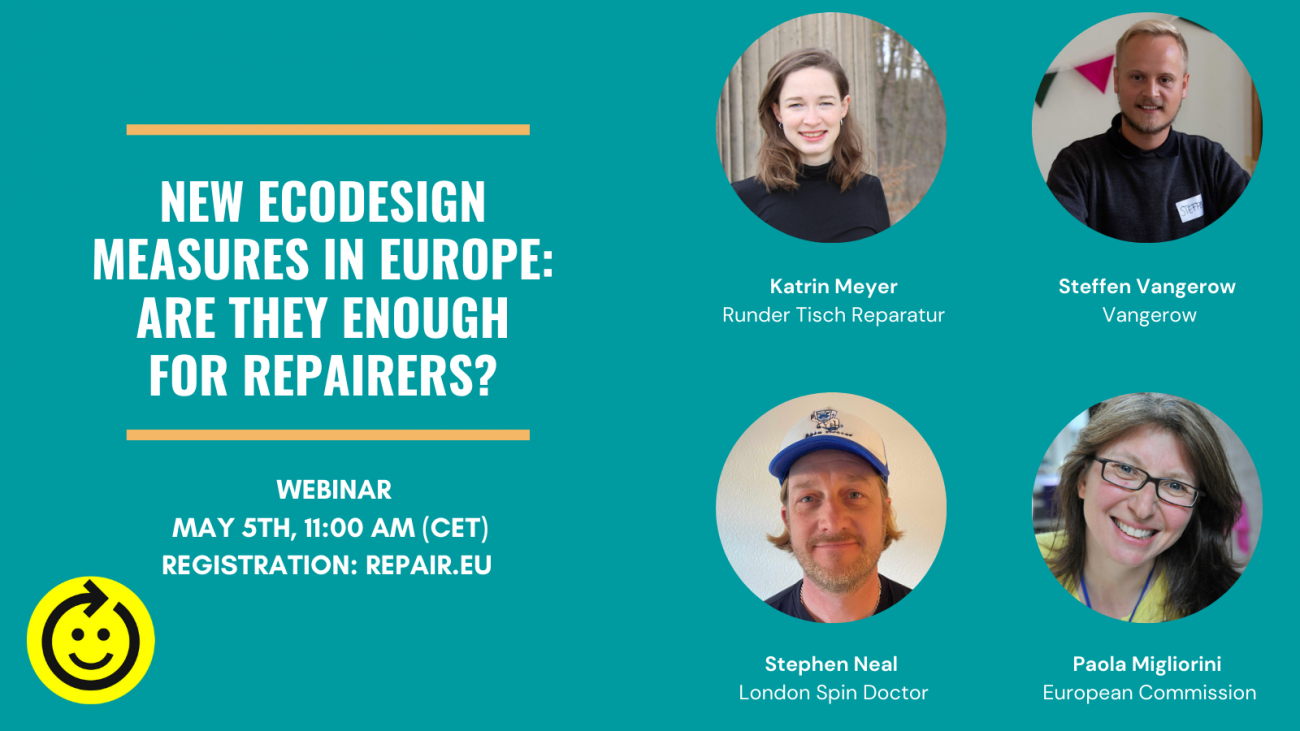On March 1st 2021, the first ever regulations on repair for appliances came into force in Europe.
Four types of electrical appliances will now have to be more easily repairable and longer-lasting following the entry into force of these new EU Ecodesign measures: washing machines, dishwashers, fridges and displays (including TVs).
While these new rules are an important step, they do not mean we have the Right to Repair in Europe. Yet.
To better understand what these new regulations mean for repairers on the ground, what should be done to ensure a universal Right to Repair and what the next steps will be in Europe, we hosted a webinar with contributions from Katrin Meyer from campaign member Runder Tisch Reparatur, two professional repairers, Steffen Vangerow from Vangerow in Germany and Stephen Neal from London Spin Doctor and Paola Migliorini from the European Commission’s DG Environment.
All panelists – and especially the professional repairers – shared lots to reflect on – and inspired plenty of questions from the audience.
From cost of spare parts to software: many challenges remain
“When I started the job more than 20 years ago, every single appliance was repairable. Everything came in parts. You broke it, you fixed the broken component, you put it back, it worked.”
Stephen Neal
It’s clear that, the new Ecodesign measures won’t radically change the work of the repairers who spoke at the webinar. While they’re a positive first step, they don’t address at all the cost of spare parts which is one of the main barriers to repair.
For Stephen Vangerow, the cost of spare parts is the reason many products don’t get repaired. As some manufacturers have a monopoly on spares, they can dictate their prices and eventually the repair cost is too close to the price of a new product for many consumers.
For Stephen Neal, who repairs household appliances, the price of spare parts can be 6 or 7 times what he charges in labour cost, which leads his customers to refuse repairs on a daily basis. As he puts it “the cost of a washing machine bearing [replacement] is pretty much the same as a new machine. My spares bills have quadrupled in the last few years”. Neal refers to the bundling of some key spare parts, such as washing machine bearings and drums, which is unfortunately allowed under the new regulations.
In terms of repair information, the new Ecodesign regulations do not make schematics available to repairers despite being extremely useful for component repairs. Stephen Neal added that while he uses manufacturers’ websites for repair information, he often needs to ask insights from his repair engineer friends working for manufacturers across the country, especially for newer appliances.
While the new regulations are already triggering some improvement – for example Miele sharing some additional repair information on their website in Germany – more needs happening, starting from manufacturers listing all the appliances’ error codes in documentation available to consumers and repairers.
Finally, repairers had different views on the software issues and repairs. While Neal reported that software failures are no longer common for household appliances, they represent a growing threat for the repair of small electronics. Serialisation for instance, which means pairing by manufacturers of specific parts serial numbers with specific devices via software is witnessed more and more by Steffen Vangerow. And it could progressively reduce the role of independent repairers.
“I’m a bit afraid for the future because serialisation can be done on every part”.
Steffen Vangerow
As for the European Commission, Paola Migliorini explained it’s currently working on 3 aspects of Right to Repair: one on product (developing minimum requirements to make products more repairable), one on production and one on consumers (reviewing consumer law to possibly introduce additional information about the availability of spare parts for certain products for example). Some of this work should be made public by the end of the year.
If you enjoyed the webinar and the discussion on this issue, subscribe to our newsletter here and donate here! Don’t hesitate to let us know with a comment which topics you’d like our next webinar to be on.

